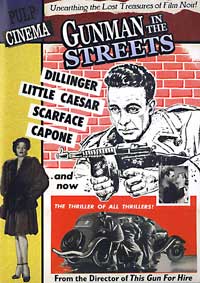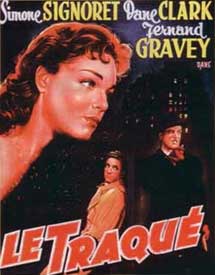Gunman in the Street (1950) is a UK/French production skillfully emulating the style & content of American film noir, as might've been expected of California director Frank Tuttle whose This Gun For Hire (1942) is a recognized classic for the genre.
His later obscurity was not due to a falling off in the quality of his work, but because he was blacklisted thanks to McCarthyism & fled temporarily to Europe. When he returned in 1951 to name names in front of the House Un-American Activities Committee. This did him no moral credit & it would be another five years before he could work in America,
 Released in 1950 in Paris as Le Traque, in the UK in 1951 as Gunman in the Street, & the same year in Canada as Gangster at Bay, it was not released in the United States until syndicated for television in 1963 as Time Running Out. The latter version removed some scenes of violence, including the harsh scene of the bullet removal. It was a rarely scene film noir until it was restored for dvd in 2001. Released in 1950 in Paris as Le Traque, in the UK in 1951 as Gunman in the Street, & the same year in Canada as Gangster at Bay, it was not released in the United States until syndicated for television in 1963 as Time Running Out. The latter version removed some scenes of violence, including the harsh scene of the bullet removal. It was a rarely scene film noir until it was restored for dvd in 2001.
Eddie Roback (Dane Clark), a small time American gangster & army deserter in postwar Paris, steals himself a cool trenchcoat in an early scene, after an opening sequence showing a shoot-out in the street during "a daring daylight robbery."
Eddie's gang is captured, but he's on the run hiding in busy places of Paris, with a bullet in his arm. Denis Vernot (Simone Signoret) is Eddie's girl, well known also to the police inspector (Fernand Gravey).
She is heroically faithful to the gangster, whether or not from actual love is uncertain, probably from some deeper sense of duty. Things could've gone a lot easier for her if she'd fallen to the temptation to be a femme fatale & betrayed him, but she never wavers from her peculiar devotion. Frank Clinton (Robert Duke), American newspaper correspondent, would clearly be a more sensible boyfriend for Denis, but her faithfulness to Eddie is unshakable.
A great part of the film's success is in trying to understand if Denis has some secret reason for risking everything for such an unappealing thug. It doesn't seem to be misguided love, but something more personal, as though she embodies some female equivalent of the duty of a samurai who, having sworn vassalage, remain true less to the lord than to the oath.
Certainly it's a story of nihilism, as Eddie is never going to give himself up even if it's the only way he'll stay alive, just as Denis will not waver in supporting Eddie in his decisions no matter the inevitable outcome. The climactic shoot-out is shocking in its insistence on violence with no element of self-preservation, nihilism taken to the limit.
copyright © by Paghat the Ratgirl
|

 Released in 1950 in Paris as Le Traque, in the UK in 1951 as Gunman in the Street, & the same year in Canada as Gangster at Bay, it was not released in the United States until syndicated for television in 1963 as Time Running Out. The latter version removed some scenes of violence, including the harsh scene of the bullet removal. It was a rarely scene film noir until it was restored for dvd in 2001.
Released in 1950 in Paris as Le Traque, in the UK in 1951 as Gunman in the Street, & the same year in Canada as Gangster at Bay, it was not released in the United States until syndicated for television in 1963 as Time Running Out. The latter version removed some scenes of violence, including the harsh scene of the bullet removal. It was a rarely scene film noir until it was restored for dvd in 2001.